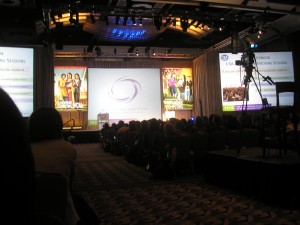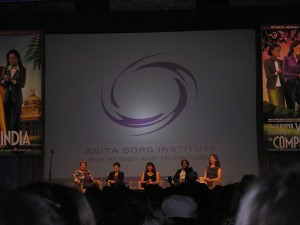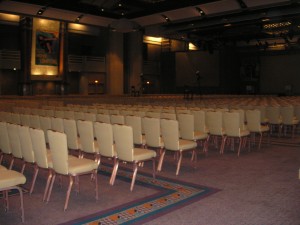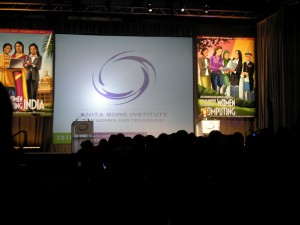-
The schedule in the program. Color-coded, clear, concise. What more could I need? It made figuring out what panels to attend and what rooms to go to remarkably easy. The map helped, too. Better yet, the GHC '10 wiki has notes on many of the talks I had to miss!
-
An unplanned interview. I was chatting with a recruiter about my past research experience, expecting to be directed to the company's careers website if I was interested in applying for a post-graduation job. I was - as expected - but at the end of the conversation, the recruiter asked if I'd have time the next morning for an official interview! My interviewing skills are a little rusty, and as long as I don't change my mind again about taking time off before grad school, I'll definitely be applying for a job at the company. On that note, I should mention:
-
The tabling. Universities, tech companies - I'm their target soon-to-be-graduating-college market, and they were all recruiting. I handed out copies of my resume, signed up for mailing lists, and collected a veritable stack of brochures. I even got to watch one recruiter look over my resume, nod, smile, and say to a fellow recruiter, "No worries here!" (Ego-boosting moment, indeed.)
-
Thursday's keynote speaker. Duy-Loan T. Le, a Senior Fellow at Texas Instruments, spoke brilliantly about the difficulties she has faced (and overcome) as a woman in technology. She focused on camaraderie and cross-gender collaboration, weaving stories from her own life into her counsel. I'm pretty sure members of the audience cried - she was that good of a speaker.
-
The swag. 3 flash drives (4gb total), 5 t-shirts, 21+ writing utensils, tape measures, screwdrivers, lip balm, a pair of Google sunglasses, and some other stuff. How could I not mention all that as a hightlight?
-
Free wireless. It was particularly useful on Friday after the Sponsor Night festivities, when several of my classmates and I needed to ssh into our CS department accounts to work on homework for our AI class.
-
Georgia Tech's HCI and HCC research. I attended Elizabeth Mynatt's introduction to human-centered computing (HCC), in which she presented examples of how current research at the Graphics, Visualization, and Usability (GVU) Center at Georgia Tech enables creativity, wellness, learning, and more. I also showed up to the later panel on new HCI research, which was followed by a field trip to the GVU Center! A large group of us wove our way through Atlanta (the weather was beautiful) over to the research center, where we got to see demos of tons of cool projects. Haptic passive learning, computer programs you can control with your brain, multi-touch tables for manipulating searches and information - very cool stuff!
-
Sponsor Night's pasta. One of the many dishes served at the Sponsor Night buffet was this fantastically delicious squash-stuffed ravioli smothered in creamy alfredo. It was really good. I'd like to find the recipe.
-
Good advice. And lots of it! Being one of the younger women in the crowd, I was in the perfect place for everyone's words of wisdom. Advice on grad school, advice on early careers and job-seeking, advice on interviews, advice on life in general. Stay tuned - I'll relay some of the best nuggets in an upcoming post!












